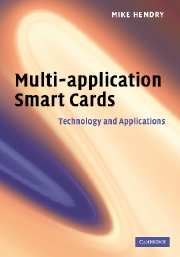Book contents
- Frontmatter
- Contents
- Foreword by Kevin Gillick
- Acknowledgements
- Part I Introduction
- Part II Technology
- Part III Business requirements
- 13 Common business requirements
- 14 Telecommunications
- 15 Banking
- 16 Transportation
- 17 Government and citizens' cards
- 18 Campus cards and closed user groups
- Part IV Implementation
- Appendix A Glossary
- Appendix B Further reading
- Appendix C Standards
- Index
18 - Campus cards and closed user groups
from Part III - Business requirements
Published online by Cambridge University Press: 11 August 2009
- Frontmatter
- Contents
- Foreword by Kevin Gillick
- Acknowledgements
- Part I Introduction
- Part II Technology
- Part III Business requirements
- 13 Common business requirements
- 14 Telecommunications
- 15 Banking
- 16 Transportation
- 17 Government and citizens' cards
- 18 Campus cards and closed user groups
- Part IV Implementation
- Appendix A Glossary
- Appendix B Further reading
- Appendix C Standards
- Index
Summary
For many of the card schemes discussed so far, the card has as much marketing as operational value for its issuer; it ties the consumer to the issuer and provides a channel for delivering services and differentiation. This chapter is concerned with a group of applications where the card-holder is already a member of a defined group, and the aim of the card is often to raise barriers around the group and prevent infiltration or abuse of the privileges of the group.
These include not only employee card schemes, schools and universities, but also holiday camps and clubs, prisons and detention centres. Athough they are often referred to as campus cards, the scope may be much wider than a physical campus or group of sites.
Sometimes principles that apply to public schemes must be completely rewritten for this environment: for example, employees may accept the storage of personal data or a biometric on the card as a condition of employment. Laws governing payments in legal tender may not apply to canteens or on-site vending machines.
For this reason it is often difficult to mix campus cards with open applications: for example, several banks have found it difficult to act as a card issuer for an electronic purse on a university card, since they are subject to regulation that imposes high standards and costs, and that makes it difficult to meet the rapid turnaround required to address lost cards in a university environment.
- Type
- Chapter
- Information
- Multi-application Smart CardsTechnology and Applications, pp. 201 - 210Publisher: Cambridge University PressPrint publication year: 2007



